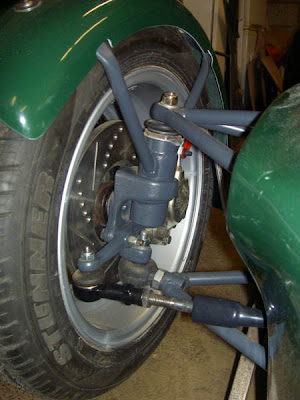Just seen a posting on the JPSC forum about fitting 13" wheels on an IRS Sylva Striker.
I was a little surprised at the pictures of a professionally modified car (not by Sylva) that has the rear suspension load passing through a spherical rod end shank in bending. The drawing below shows the arrangement. Rods ends should not be loaded in a way that tends to bend the threaded shank. The entire mass of car + bump load + weight transfer and brake torque will be fed through shank of the rod end in shear. OK you could install a joint large enough to take the load, but it would be far too big and heavy. Another thing to bear in mind, threads make very effective stress raisers!
Below is how it is done on a Sylva Riot. The shock mount is as outboard as possible and a metalastic bush is used to resolve the spring load. The bending load is minimal and what little there is is fed through the wishbone itself.
If the compliance of a metalastic bush can not be tolerated, a spherical bearing (not rod end) could be used instead. This is OK as it has no shank. It is normally installed in a machined housing and retained with a circlip. The housing is welded to the wishbone in place of the ferrule that retains the metalastic bush.




